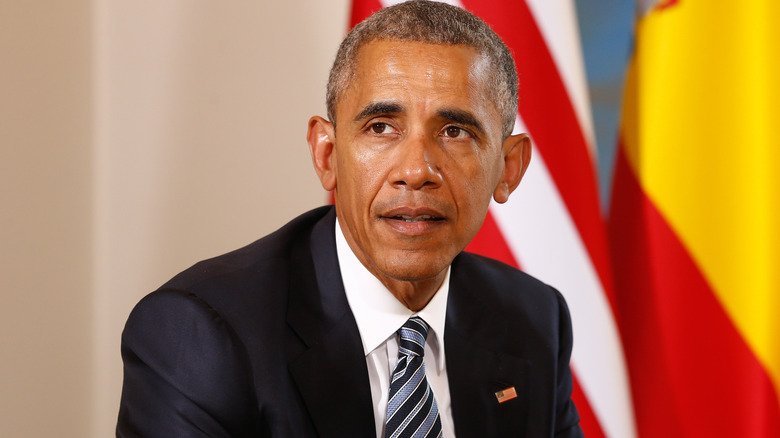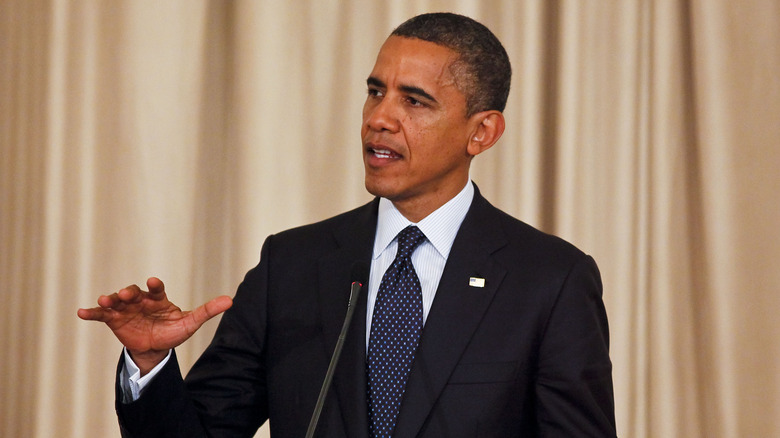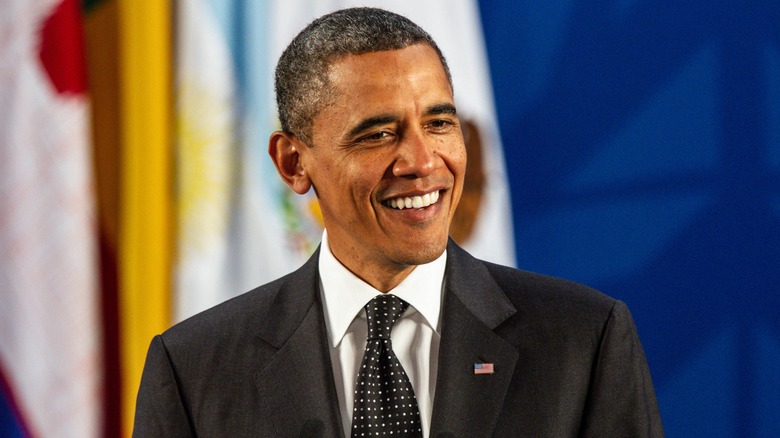Barack Obama's Most Candid Confessions About His Former Drug Use
Former President Barack Obama isn't the only American politician who has admitted to using drugs. He is, however, one of the few who treated it as a health problem as opposed to a criminal one. This perspective is clearly reflected in his candid confessions about his struggles with drug use. Barack Obama published his memoir "Dreams From My Father: A Story of Race and Inheritance" in 1995, more than a decade before he ran for the presidency. In this book, the former president made it clear that he had smoked weed and cigarettes, drank alcohol, and even dabbled in cocaine.
On page 53, he wrote, "Pot had helped, and booze; maybe a little blow when you could afford it." In this context, "pot" and "blow" are slang terms for marijuana and cocaine, respectively. Obama added, however, that there were some drugs he had not tried: "Not smack, though — Micky, my potential initiator, had been just a little too eager for me to go through with that." This wasn't the only mention of drug use in his memoir, which also gave a peek into Barack Obama's tumultuous relationship with his republican brother Malik.
Barack Obama admitted he'd been on the path to becoming an addict
Barack Obama's candid confessions about his former drug use continue on page 54 of his memoir. He writes, "Junkie. Pothead. That's where I'd been headed: the final, fatal role of the young would-be black man." He goes on to dismiss the notion that he used drugs to prove he was a "down brother." Instead, he explains that it had been an escape: "I got high for just the opposite effect, something that could push questions of who I was out of my mind." He further writes that getting high was his way to" flatten out the landscape" of his heart and "blur the edges" of his memory.
Obama was like many children who grew up without a father — one who had abandoned him by choice. As he once explained in a speech, he was angry — a fact his young mind couldn't understand. What he did understand was that the dissatisfaction driving people to drugs was a great unifier, a temporary bond among those seeking an escape from their realities. He wrote in his book, "Everybody was welcome into the club of disaffection. And if the high didn't solve whatever it was that was getting you down, it could at least help you laugh at the world's ongoing folly and see through all the hypocrisy and bulls*** and cheap moralism."
Obama eventually learned drugs were a temporary fix to a deeper problem
In "Dreams From My Father," Obama writes of his realization that drugs could not solve his problems: "That was the problem with booze and drugs, wasn't it? At some point, they couldn't stop that ticking sound, the sound of certain emptiness." Obama's struggle with drugs continued until he transferred to Columbia University in New York City.
When his initial plans for accommodation fell through, he was forced to reach out to Sadiq, a friend who was also involved in the drug lifestyle. While Sadiq had predicted that the city would "eat away" at his goals, the opposite occurred. Obama writes, "The city had indeed had an effect on me, although not the one he'd expected. I stopped getting high."
He added that he began running three miles daily, with a weekly Sunday fast. Rather than slacking off in school, Barack Obama doubled down and applied himself to his school work in addition to "keeping a journal of daily reflections and very bad poetry." However, his cigarette use continued up until the White House when a particular incident finally convinced Barack Obama to stop smoking. The former president's journey from a youth struggling with drug problems to becoming the president of the United States is inspiring. It is an encouraging indicator that we can all choose to rise above the circumstances we find ourselves in.
If you or anyone you know needs help with addiction issues, help is available. Visit the Substance Abuse and Mental Health Services Administration website or contact SAMHSA's National Helpline at 1-800-662-HELP (4357).


